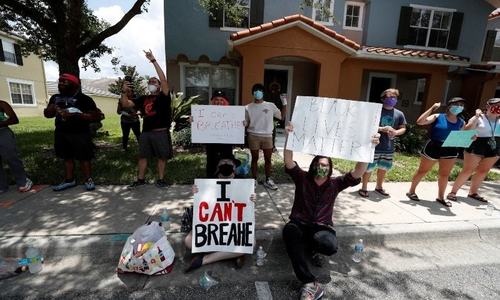LONDON: London’s mayor announced on Tuesday that more statues of imperialist figures could be removed from Britain’s streets after protesters knocked down the monument to a slave trader, as the killing of George Floyd in Minneapolis continued to spark protests and drive change around the world.
On the day Floyd was being buried in his hometown of Houston, Texas, London Mayor Sadiq Khan said he was setting up a commission to ensure the British capital’s monuments reflected its diversity.
The Commission for Diversity in the Public Realm will review statues, murals, street art, street names and other memorials and consider which legacies should be celebrated, the mayors office said.
It is an uncomfortable truth that our nation and city owes a large part of its wealth to its role in the slave trade and while this is reflected in our public realm, the contribution of many of our communities to life in our capital has been willfully ignored, Khan said.
International protests of racial injustice and police violence that Floyd’s May 25 death spurred show no sign of abating. A white police officer who pressed a knee on Floyd’s neck for more than eight minutes has been charged with murder.
Staff members and lawmakers in Britain’s Parliament held a minute of silence in Floyd’s memory on Tuesday. Demonstrators planned to gather in London’s Parliament Square for a socially distanced vigil later.
France has seen nationwide protests calling for greater law enforcement accountability, and more demonstrations are planned for Tuesday evening.
Floyd’s death has resonated especially strongly in Frances banlieues, or suburbs, where poverty and minority populations are concentrated. Protesters marching in solidarity with US demonstrations over Floyd’s death have also called for justice for Adama Traore, a young man of Malian origin whose death in French police custody in 2016 is still under investigation.
French Prime Minister Edouard Philippe has met police and citizens’ groups as part of efforts to calm tensions.
He said Tuesday that the code of police ethics would be reviewed. The French government has also announced that the chokehold would no longer be taught in police training.
Demonstrators in the UK and elsewhere are also seeking to right historical injustices and remove symbols of oppression. On Sunday, protesters in the southwestern English city of Bristol hauled down a statue of Edward Colston, a 17th-century slave trader and philanthropist, and dumped in the citys harbor.
Many Bristolians welcomed the statues removal, but the British government called it an act of vandalism.
British Prime Minister Boris Johnson acknowledged that it was a cold reality that people of color in Britain experienced discrimination, and promised his government was committed to eradicating prejudice and creating opportunity.
But he said those who attacked police or desecrated public monuments should face the full force of the law.
Colston’s demise has reinvigorated Oxford University campaigners calling for the removal of a statue of Cecil Rhodes, a Victorian imperialist in southern Africa who made a fortune from mines and endowed the university’s Rhodes scholarships.
As the Rhodes Must Fall group planned to protest Tuesday at the statue, a banner erected in Oxford declared: Rhodes, you’re next.
The city of Oxford encouraged the university’s Oriel College to apply for permission to remove the statue so that it could be placed in a museum. The college has for years resisted campaigns to take Rhodes down from his place above its main entrance.
Published in Dawn, June 10th, 2020
















































